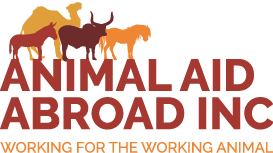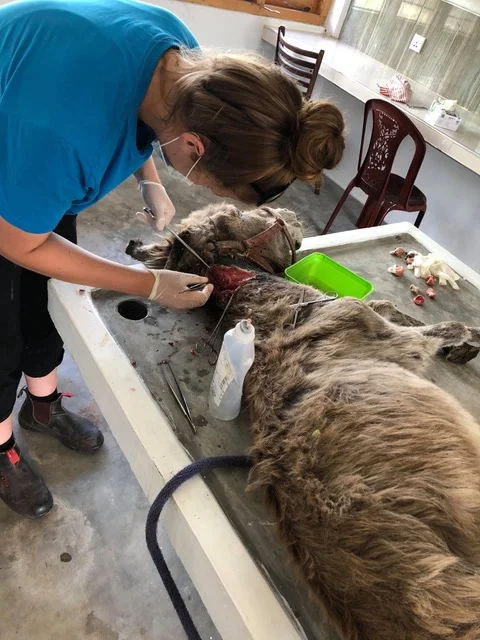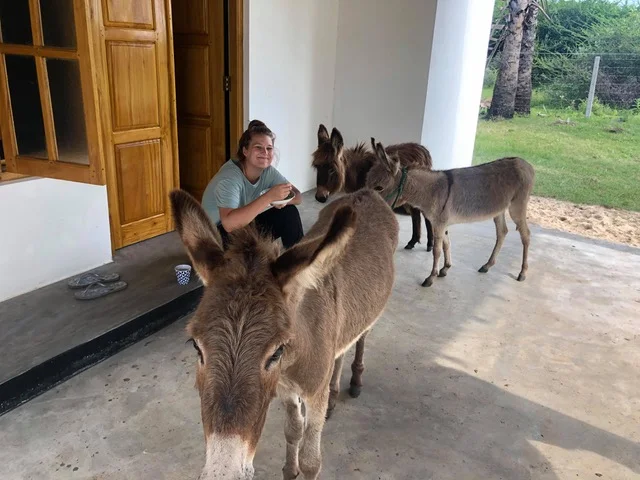Murdoch Vet students helping donkeys in Sri Lanka
Our two weeks in Mannar were a truly memorable and eye-opening experience. As vet students from Australia we had never been exposed to such horrific injuries. As well as trauma injuries from accidents, many of the feral donkeys we treated during our time there were horribly maggot infested simply because they hadn’t had any medical attention. Unfortunately, nearly all of the Mannar community don’t care for the lives of these feral animals. They’re a nuisance, a pain and good riddance if they die - a concept that is foreign to us as Australians. A lot of the work that the Donkey Clinic and Education Centre [ DCEC] is doing is not only about rescuing and treating injured donkeys, but about educating the community on how to care for and utilise these beautiful animals. Our time spent with the children at the Donkey Assisted Therapy Centre [ DAT] was truly memorable and a perfect example of how the DCEC is engaging and educating the community while working to give the donkeys purpose and therefore meaning again.
The DCEC is a truly welcoming and warm place and local children began coming to pat and feed the donkeys. There are a number of locals who call to let the DCEC know if there are donkeys that have injuries or look to be in bad shape; others wave down the driver of the donkey rescue van to tell them where they saw a particular injured donkey. While this positive change in attitude continues to grow, we had a horrible reminder of how much education is still needed in this community. Two donkeys that had wandered into the hospital carpark were beaten, shot and left out for feral dogs to eat. We were shocked; but unfortunately this wasn’t the first incident and undoubtedly won’t be the last. This isolated incident shows the importance of continual education on animal welfare going forward, something that Bridging Lanka are really showing a drive and commitment to.
When the lads from the DCEC took us around Mannar, we saw the state of the stray dogs and cats in the area. A main concern of ours was their welfare; the extent of starvation, mange and all manner of physical disabilities. At the time there was no strategy or plan in place for the future. This is why we were so glad to hear that Animal Aid Abroad is providing funding for this. By controlling the population through de-sexing and providing basic medical care, the change seen will be immense. We’re excited to support and spread awareness of this cause to other vet students and the Murdoch community.
Another challenge for us during our time in Mannar was the extreme culture shock in regards to urgent animal care. A lot of our time was dedicated to treating the donkeys and desensitising them to human contact by providing love and care. We also spent time educating the locals on basic equine knowledge, which was understandably lacking due to virtually no equine contact occurring in the country, including providing immediate and consistent care to sick and injured animals. We both noticed a significant positive change in the attitude of all DCEC employees during our stay and a readiness to take on board any and all suggestions. We were given opportunities to perform procedures and surgeries that would not have been offered to us back in Australia, giving us a unique and rewarding experience that we want to ensure more students can also be given at this early time in our veterinarian studies.
We’ve been really touched by the feedback we received from the staff. Knowing that the knowledge we shared was really valued and incorporated into the program makes us sure that the projects Bridging Lanka and Animal Aid Abroad are working on will continue to make a profound difference to the small Mannar community and the welfare of so many animals.
By Megan Morley and Will Maginness [ Murdoch University, Perth Vet students ]





